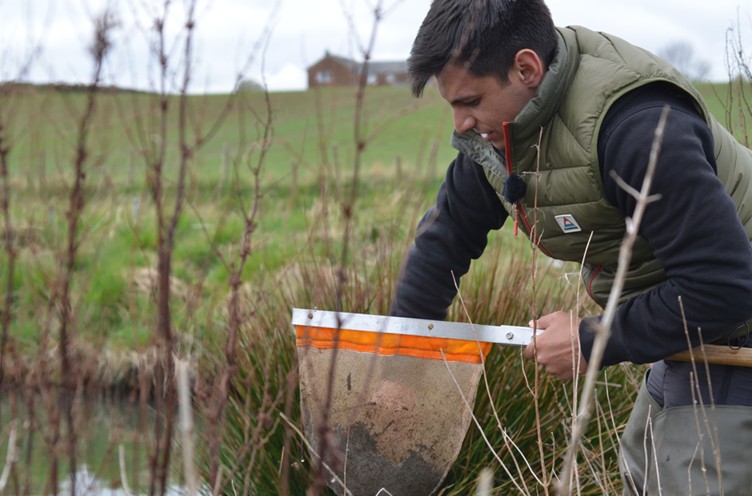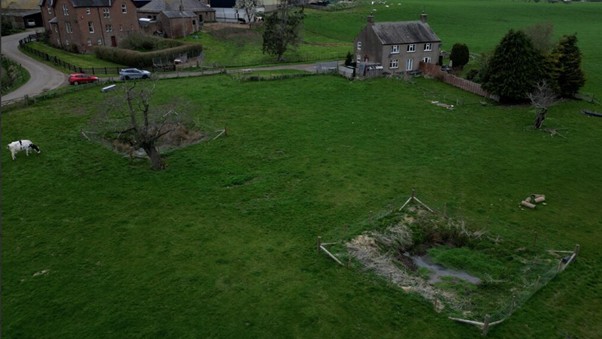Sediment ponds are small, purpose-built water bodies created through agri-environment schemes (AES) and Catchment Sensitive Farming (CSF) advice.
They are designed to trap soil, nutrients, and pollutants before they reach rivers and streams. These runoff-control features are now being recognised for another critical function, supporting aquatic life and boosting farm-level biodiversity – from mayflies to barn owls.
The Loughborough University project, based at sites in Penrith and Calthwaite, is being carried out by PhD researcher Charlie Patel in partnership with supervisors Professor Paul Wood and Dr. Kate Mathers, Dr. Jessica Durkota from the Environment Agency and Professor Adrian Collins from Rothamsted Research.
Rather than focusing solely on how much sediment and nutrients the ponds capture, the study looks below the surface – literally – to explore how these ponds support macroinvertebrate communities, including beetles, mayflies, snails, and other water-dwelling invertebrates.
“These ponds act like mini wetlands,” said PhD researcher Charlie Patel. “They slow down the water, allowing sediment to settle, and prevent nutrients like phosphorus from entering nearby rivers.
“But they also offer a habitat for aquatic insects, amphibians, and birds in landscapes where natural habitats such as ponds have largely disappeared.”

Image: Researcher Charlie Patel examines the biodiversity of one of the sediment ponds. Credit: Lboro University
This dual function – pollution control and biodiversity support – offers real benefits for farmers. Erosion and nutrient runoff not only harm the environment but also represent a loss of productive soil.
By keeping that sediment on-farm, ponds allow farmers to potentially reclaim and reuse valuable soil that would otherwise be lost downstream.
Moreover, as extreme weather events become more frequent, the ponds help store heavy rainfall, protecting fields, infrastructure, and nearby communities from flood risk.
“That’s a win for farmers and for the environment,” said Charlie.
Joe Lyall, a farmer at High Oaks Farm, in Calthwaite, has installed two such ponds on his land in the Northwest of England. Each pond is just five-by-five metres, but they catch runoff from a catchment area of over 60 acres.
“They trap sediment and nutrients that would otherwise go straight into the river,” explains Joe. “That means cleaner water downstream – but we also dig them out and reuse that sediment on the fields. So, nothing’s wasted.”
The ponds have been in place for about seven years. In that time, Joe said they’ve helped stabilise the land, improve crop health, and reduce nutrient loss from the soil.
As the climate changes, farmers are facing soil becoming more saturated and increase in runoff across agricultural land as well as more frequent and severe flooding. Joe recalls the devastation of Storm Desmond in 2015, and how ponds like his can help buffer future shocks.
“They hold back some of the floodwater during heavy rain, slowing its path through the landscape,” Joe explained. “It’s a form of natural flood management that really works.”
Whinton Hill farm manager, James Turner, agreed. He described sediment ponds as a ‘critical missing piece’ in how we manage our water systems.
“They’re part of a wider toolkit,” said James. “Used alongside things like buffer strips and wetland restoration, they help restore the balance between farming and nature.”
Beyond farming and flood control, the ponds are proving a magnet for biodiversity. On Joe’s farm alone, they’ve helped improve a trout habitat in local streams and sparked a rise in birdlife.
“We’ve seen herons, damselflies, and yellowhammers come back,” said Joe. “It’s great to hear the birdsong again – it makes you feel like you’re doing something right.”

Image: The sediment ponds at High Oaks Farm, Cumbria. Credit: Lboro University
Chris Turner, a soil protection advisor, has monitored these changes firsthand.
He said: “We’re seeing improved invertebrate life in the river, which has knock-on effects right up the food chain.
“And farmers like Joe are showing that these benefits don’t come at the expense of productivity – they actually support it.”
As extreme weather events increase, the researchers are calling for wider adoption of sediment ponds and other natural solutions.
“We want policymakers to recognise the full value of these systems,” said Charlie. “This is not just about wildlife – it’s about resilience, food security, and protecting people’s livelihoods.”
Farmer Joe added: “They’re simple, cheap, and they work. We’ve got better soil, cleaner water, and more wildlife. What’s not to like?”
This article has been published as part of Loughborough University’s PR Environment campaign. Further information on the campaign can be found in the launch press release.
ENDS
Video (downloads and embed codes):
Download video/audio (inc. raw files): https://www.lboro.ac.uk/media-centre/videos/2025/impacts-of-sediment-ponds/
YouTube video link: https://youtu.be/puhEMwsdwnY
YouTube embed link: <iframe width="560" height="315" src=https://www.youtube.com/embed/puhEMwsdwnY?si=XcL39aTSDkyCjxmv title="YouTube video player" frameborder="0" allow="accelerometer; autoplay; clipboard-write; encrypted-media; gyroscope; picture-in-picture; web-share" referrerpolicy="strict-origin-when-cross-origin" allowfullscreen></iframe>
Please credit 'Loughborough University', where possible.
For further video/audio support, please contact d.t.vincent@lboro.ac.uk